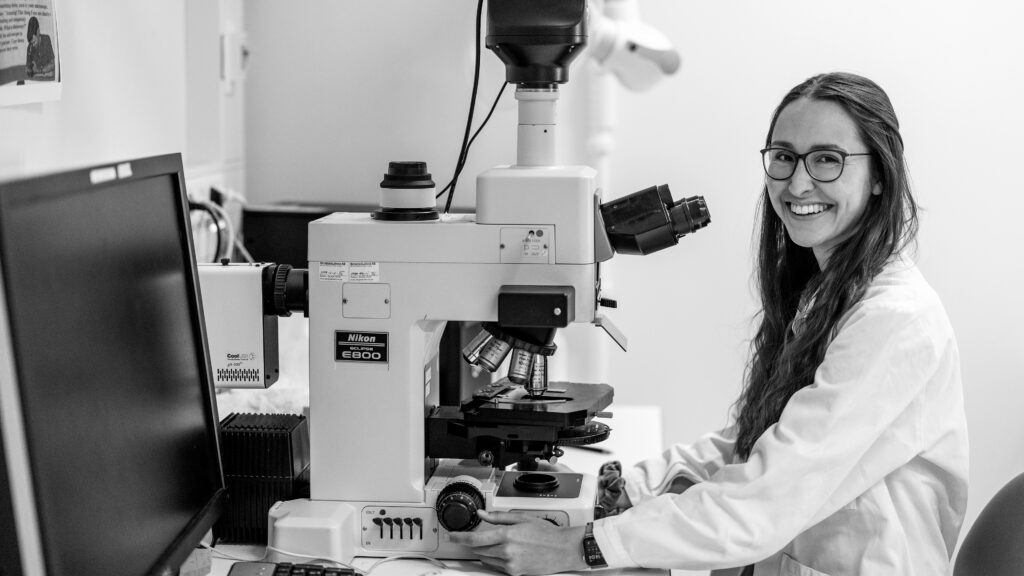Stepping outside the lab and into dialogue with the public was a truly enriching experience for me. I did not only grow personally but also got to view my research from a different perspective. I also got reinforced in my belief that communication is the key to making science accessible to everyone.

As part of Researchers’ Grand Prix regional heat in Stockholm 2023, I faced the challenge of presenting my research in only four minutes to high school students. Researchers’ Grand Prix is an annual competition looking for the most engaging and understandable scientific presentation. Many researchers are driven by making the world a better place, and so am I. As a doctoral student at Karolinska Institutet in basic medical research, I am diving into the secrets of cells to better understand how Alzheimer’s disease develops.
During my daily laboratory work, it is easy to lose track of the ultimate goal to improve people’s lives and get lost in the details of the research question. Competing in the Researchers’ Grand Prix made me zoom out and place my scientific work into a wider context. Breaking down difficult scientific concepts opened my eyes to finding new connections in my research project. Further, through taking part in the competition I improved my skills in science communication. These are not only useful in making science more accessible to a general audience but also when presenting within a scientific environment.
Competing in the Researchers’ Grand Prix made me zoom out and place my scientific work into a wider context.
Many scientists love plain factual descriptions and complexity, but this is not how you engage a public audience. The principles of storytelling that are often applied in communication and marketing are also useful in communicating science. To catch the audience’s attention, it is important to not only state all the facts and technical details but rather focus on why we ask those questions and what we can gain from the scientific results. For me personally, it was also a new experience to show emotions during my presentation. I expressed my fascination for microscopes through which I am able to see what happens inside those tiny cells.
I could hardly believe it, but I won the Stockholm Researchers’ Grand Prix 2023! That means I will get to participate in the national final on 23 November 2023. I look forward to another rewarding experience trying to inspire and engage young people in science.*
The Researchers’ Grand Prix regional heat in Stockholm took place during “ForskarFredag”, a weeklong national science festival that is part of the European Researchers’ Night. The activities during “ForskarFredag” were coordinated by the Swedish non-profit organisation Vetenskap & Allmänhet (VA) located in Stockholm.
Out of my passion for science communication, I was in the middle of a one-month internship at VA which coincided with Researchers’ Grand Prix. This internship is an optional part of doctoral education at Karolinska Institutet, which allows PhD students, PostDocs and Researchers to explore alternative career paths outside of academia. Through the internship at VA, I got to look behind the scenes of organising a science festival and the upcoming final of the Researchers’ Grand Prix 2023. There are also constant efforts at VA to improve the scope of the Researchers’ Grand Prix and involve more school students, as well as other parts of the public.
While working at VA I had the opportunity to explore a lot of the different activities around “ForskarFredag”. It was wonderful to witness the school students’ curiosity in science and the creative and engaging ways scientists showcased their research.
If more researchers would occasionally step out of their research environment to communicate with the public, it could serve to build more trust in science among the public.
Science communication serves multiple purposes: engaging and educating the public, inspiring a new generation of scientists, and involving citizens in scientific processes. If more researchers would occasionally step out of their research environment to communicate with the public, it could serve to build more trust in science among the public. Additionally, explaining scientific concepts in an easy-to-understand manner forces the researcher to think in new ways, which may lead to new insights.
After finishing my internship at VA, I will go back to my doctoral studies at Karolinska Institutet with an even stronger motivation for science communication. During the internship, I could improve my communication skills and look forward to applying them in my scientific work. In the future, I would like to continue contributing to the dialogue between the public and scientists. I further hope to inspire other researchers to accept the challenge of stepping outside their research institutions and making their science accessible to everyone.
/Johanna Mayer
PhD student at Karolinska Institute and intern at VA 2023
* Johanna Mayer won second place in the Researchers’ Grand Prix 2023 national final. See the final here.
Johanna Mayer is a doctoral student at Karolinska Institutet. She is a trained biochemist and her research focuses on understanding molecular mechanisms of Alzheimer’s disease. Her one-month internship at VA is supported by the career service at Karolinksa Institutet.
Karolinska Institutet har varit VA-medlemmar sedan 2005. Läs mer om organisationen här.
